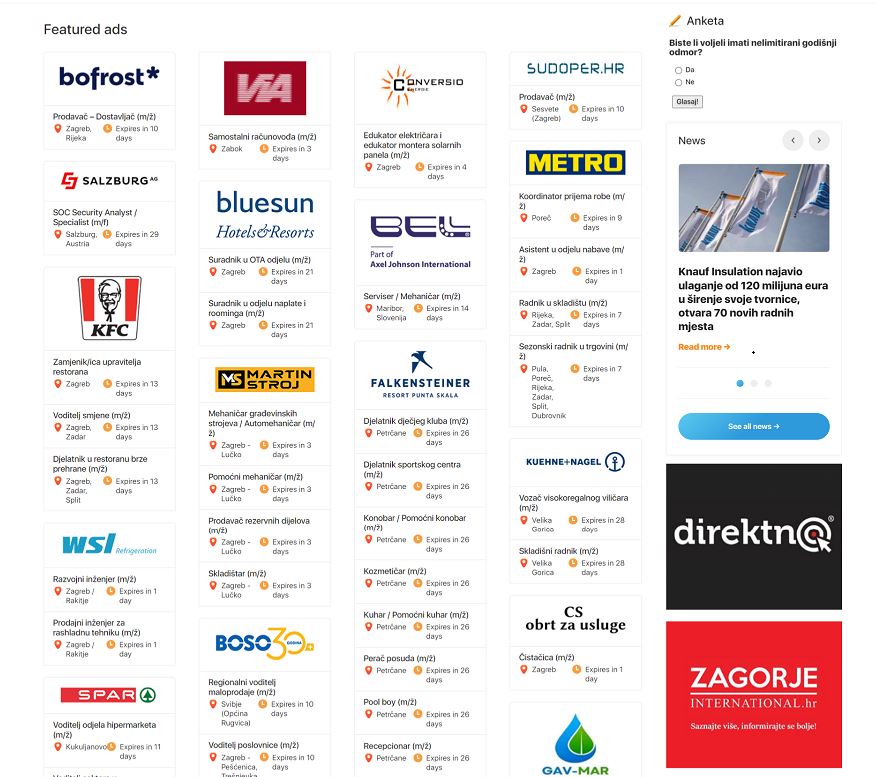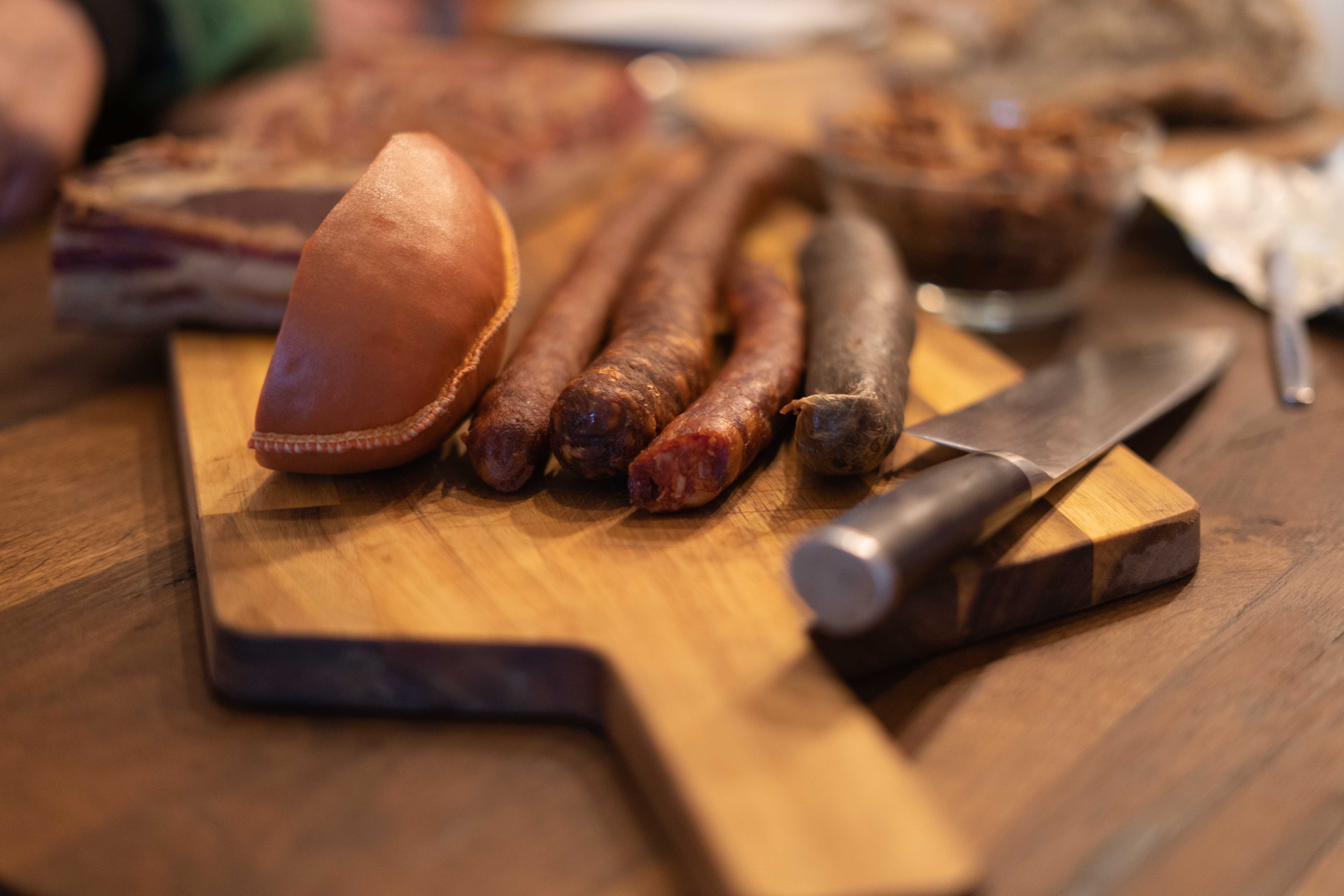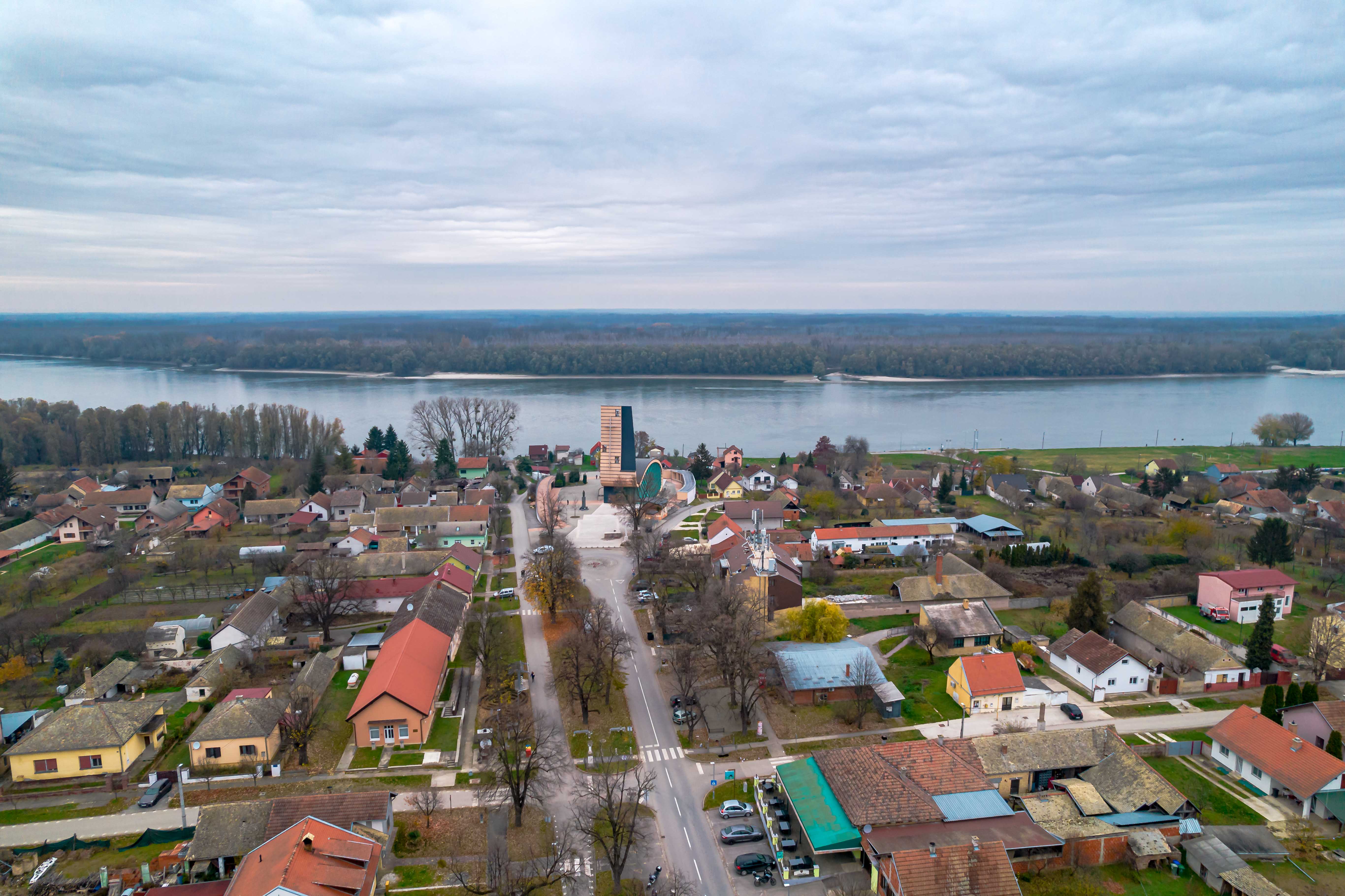A Tribute to the Magnificent Women Winemakers of Croatia
March 5, 2023 - As International Women's Day approaches, a tribute to the magnificent women winemakers of Croatia.
This is not another article about International Women's Day. It's a story of women who, like every other woman in the world, excel at their craft. What makes them even more precious to us is the nature of their art. These women make outstanding wines.
Every 8th of March, women around the world are celebrated. Women have been fighting for their rights for years in most countries. Croatia is no exception. One point of view makes Croatians more blessed than many other nations. In Croatia, women have been in charge of making wine since always. They weren't usually under the spotlight, but although it is still not that common, female winemakers do have a tradition on Croatian soil. Most importantly, they are currently making excellent wines!
How many women winemakers are there in Croatia?
We have contacted seven leading Croatian women winemakers to share their insights and expertise. They talked to us about their wines, their successes and struggles, the women who inspire them, and their views on women's place in the winemaking industry.
It is our privilege to introduce these women winemakers - as the proprietors. Since there are dozens of women enologists and even more female sommeliers in Croatia, we wanted to share the story of the woman winemakers responsible for everything from planting and farming to growing and harvesting, making wines, and also marketing and selling wine.
How many female winemakers are there?
In Croatia, there is no statistical parameter to answer the percentage of wineries a woman leads. Some women might simply be owners and not involved in winemaking. A couple of wineries are led by women professionals. There are many oenologists responsible for farming and winemaking, many female sommeliers, and many more involved in marketing, but women are still in the minority when it comes to winemaking. With women's hard work, dedication, and persistence, but also knowledge and passion, this is slowly changing.
Nonetheless, there is no doubt that women’s influence on Croatia’s wine-making process has long been present. Their craftsmanship and wisdom have offered vast contributions to the country’s winemaking tradition. These women are not only an example for women in Croatia but all over the world, and we salute them!
Inspiring Women in Croatian winemaking
Insisting on your own vision is something all of these strong-minded women have in common. Regardless of the age difference and place of origin, they all share a dedication to their craft and passion for winemaking.
It wasn't always without a challenge: "In the past, I used to receive curious glances and mistaken assumptions about my role at fairs where I was often asked to call the boss, as people assumed I was a hostess. However, now the perception has changed as our winery is recognized as a "woman's" one, particularly because my sister and I have been involved in every aspect of the business, from the challenging and less glamorous tasks to the leadership roles." Ana Peršurić, Peršurić family winery in Istria.
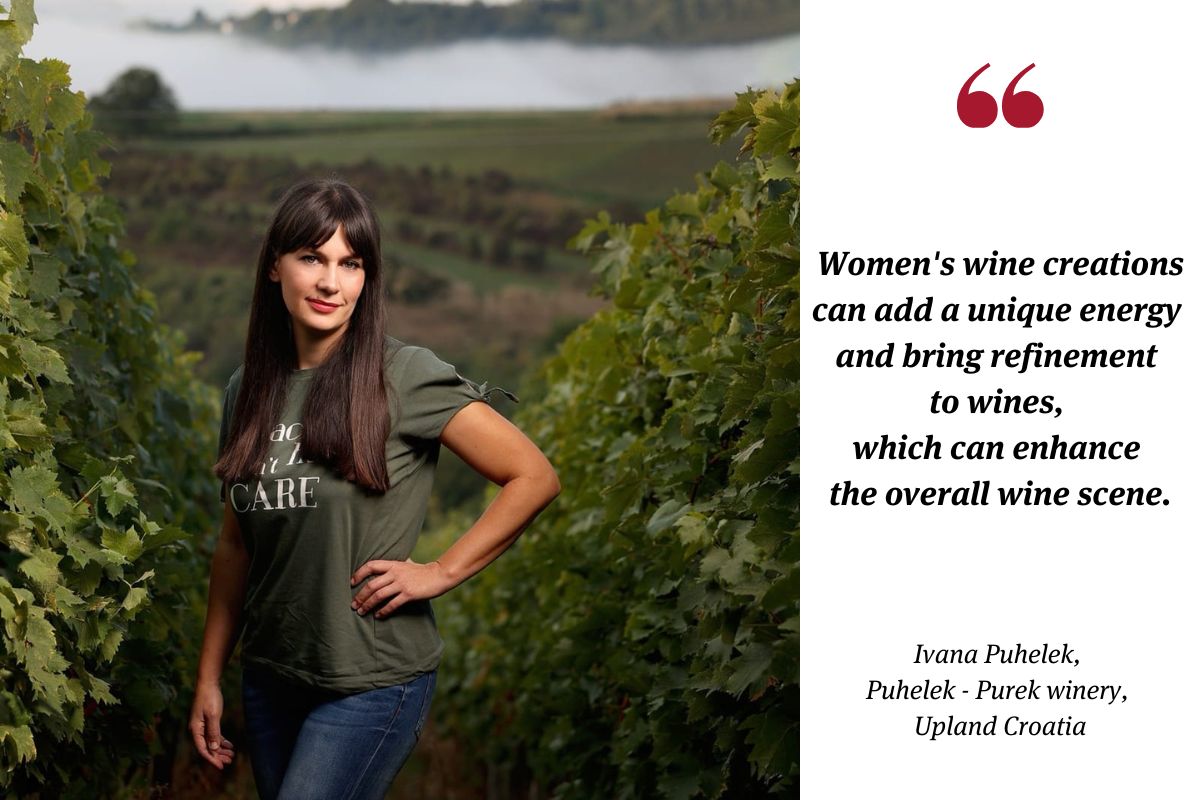
"Sometimes it is not easy for women in this business; the world of wine is traditionally a man's world in which women were not taken seriously until recently because it is a physically demanding and painstaking job, whether in the vineyard or the cellar." are the words of Ivana Puhelek, Puhelek-Purek family winery in Upland Croatia, and she continues, "On my winemaking journey, I often had to prove myself much more than men. Today, all my contacts and business relationships are related exclusively to men, and I feel completely equal with them."
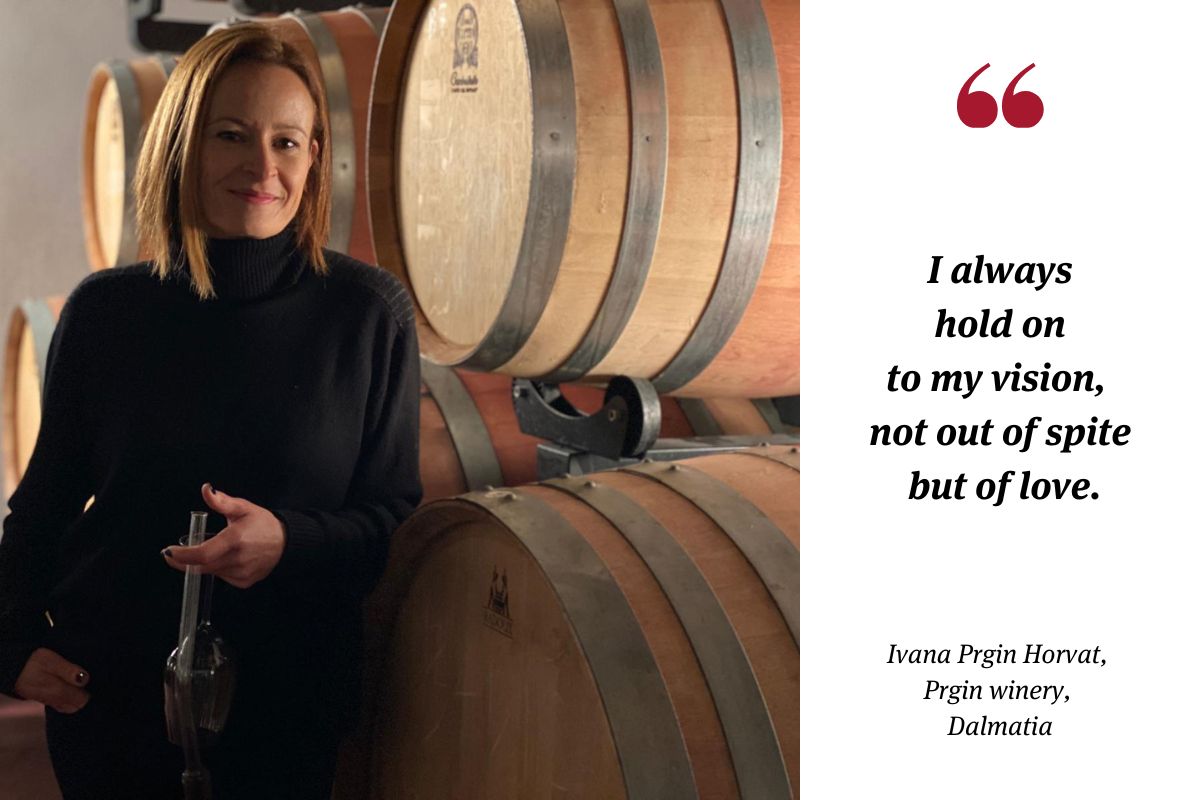
Encouraging perspective also offers Ivana Prgin Horvat, Prgin family winery in Dalmatia, "It's probable that I've encountered situations where I wasn't treated equally, but there wasn't anything specific that I could point out, nothing that burdens me... because I always insist on my vision, not out of spite, but out of love." Ivana Prgin finds an abandoned old school near Primošten and decides to accomplish her love. Her husband and children follow her love for the Babić variety and move from the capital to Primošten. "I am fascinated with legendary Bucavac vineyards where the Babić variety is a part of heritage. Growing grapes and making wine here is a continuation of a broken tradition. There is potential to achieve something truly exceptional."
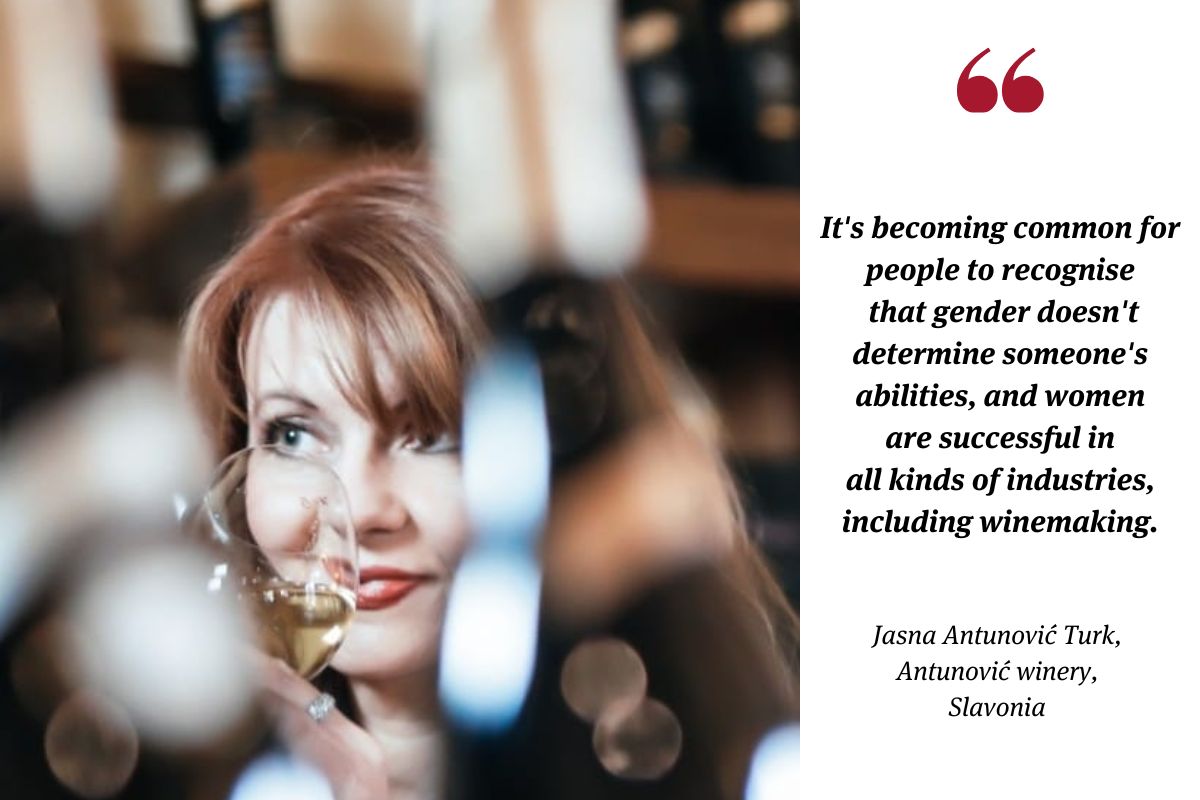
As a women winemaker who truly started from scratch, coming not from agricultural but economic sciences, planting her first vineyard in the year 2004, and building a winery afterward, Jasna Antunović, Antunović winery in Slavonia, achieved wisdom in her wines as well as in her words: "It was a leap into the unknown, but since then I am deeply aware that I belong in a world where everything is my way - the land, the Danube, the vines, wine, creativity, curiosity, challenge, and inner happiness and peace." When asked about the challenges, Jasna offers her insight: "When I first started, it took a while for people to take me seriously and recognise my abilities. But, once they saw the quality of my work, they no longer had doubts or concerns. Nowadays, it's becoming more common for people to recognise that gender doesn't determine someone's abilities, and women are becoming increasingly successful in all kinds of industries, including winemaking."
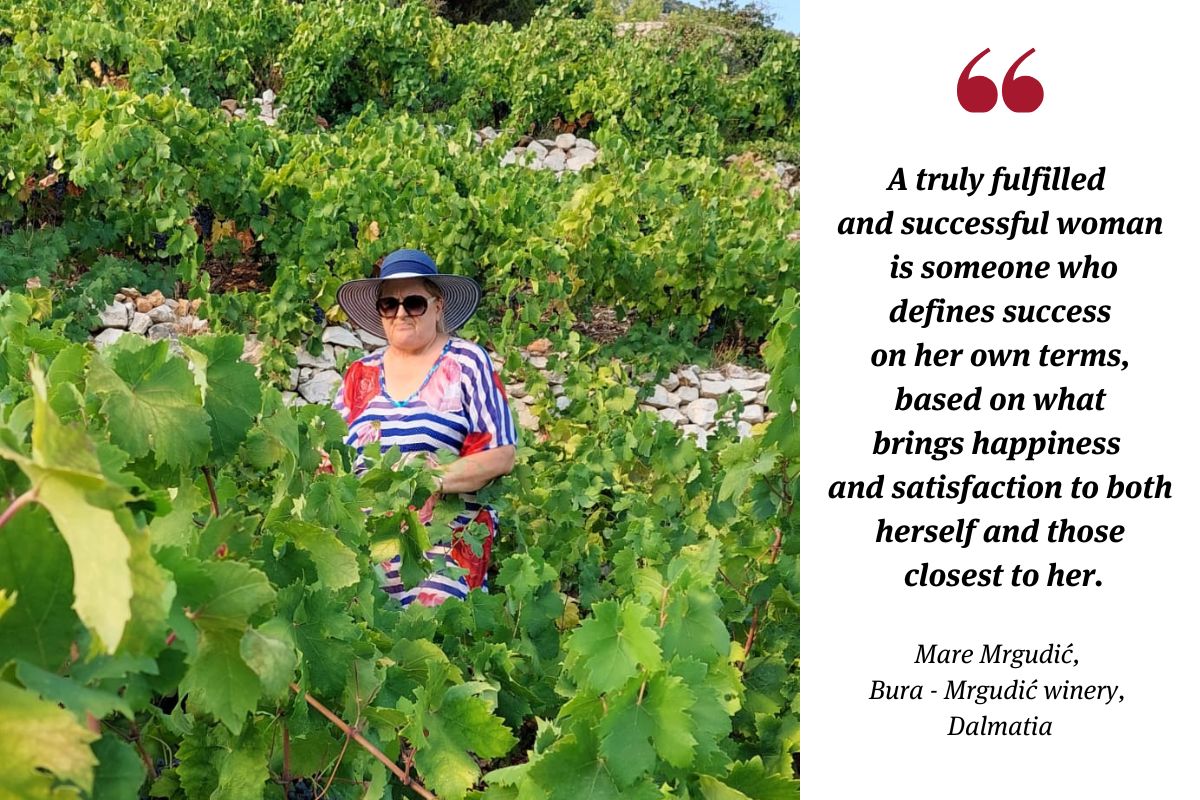
When it comes to experience and wisdom, few can compare, regardless of their gender, with the legendary Mare Mrgudić, Bura-Mrgudić family winery in Dalmatia. Aged only 11 years and having helped her mother with the vineyard works after her father's death, Marija was destined to become a winemaker. More than destiny, she was encouraged by her mother and grandmother, both accustomed to working under the Pelješac peninsula sun. Besides her mother and grandmother, Mare always mentions her other role model - Anđelka Ančić.
"Anđelka was an engineer who worked at the Dingač winery. In a small town where men usually held all the power, she managed to gain respect and trust from 500 members of the agricultural cooperative and the well-known Dingač winery. For many years, she was the leader of the wine industry in the country, and she did it all with great skill and confidence."
Mare, too, feels the prejudices are now a stereotype, although she admits she had issues with male colleagues: "Maybe they didn't take me seriously at times, but I never experienced humiliation or bullying from any colleagues in the industry. In fact, most of them were always ready to help, so from my experience, I can say that it is just an old stereotype."
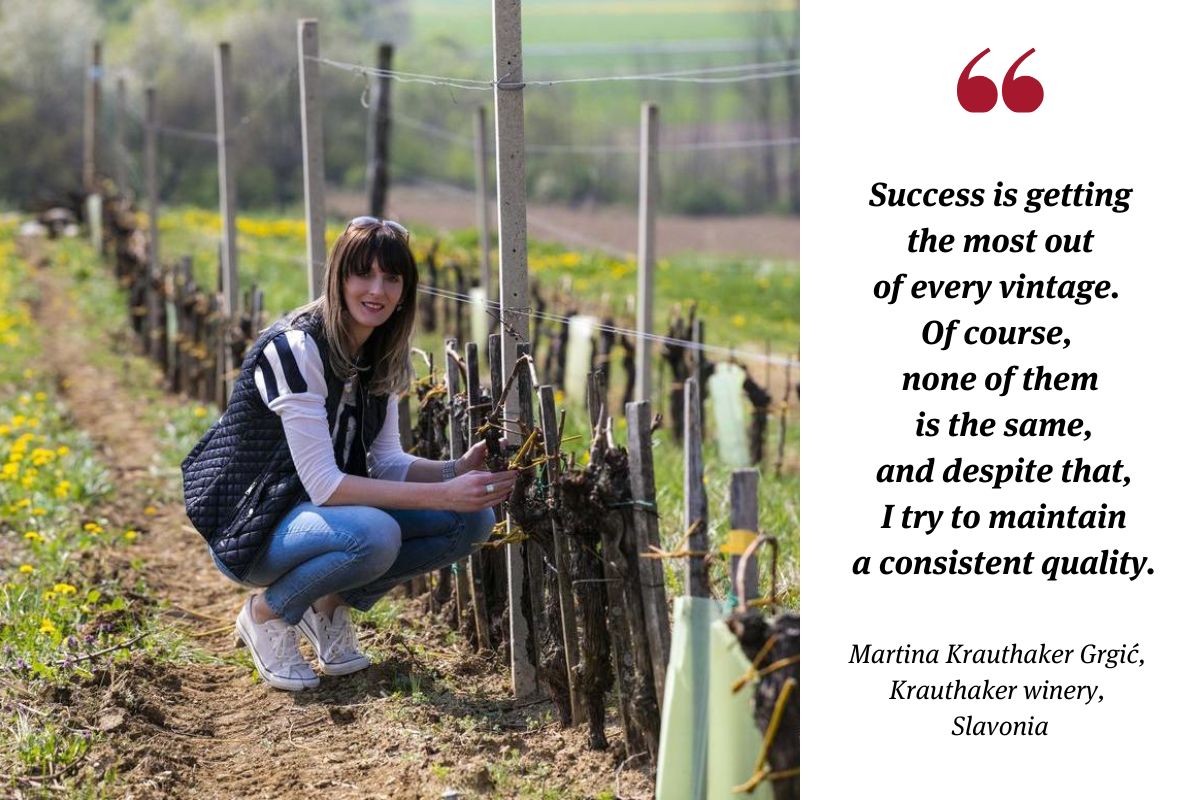
A daughter of a famous father, Martina Krauthaker, from Krauthaker winery in Slavonia, steps out of her father's shadow. For a while now, Martina has been fully responsible for running one of the most respectful wineries in Croatia. She remembers the winemaking from the very beginning as her father, Vlado Krauthaker planted the first vineyards when Martina was born. When asked about her highest accomplishments, she answered, "Success is getting the most out of every vintage. Of course, none of them is the same, and despite that, I try to maintain a consistent quality. When consumers accept the wine, it is my greatest success."
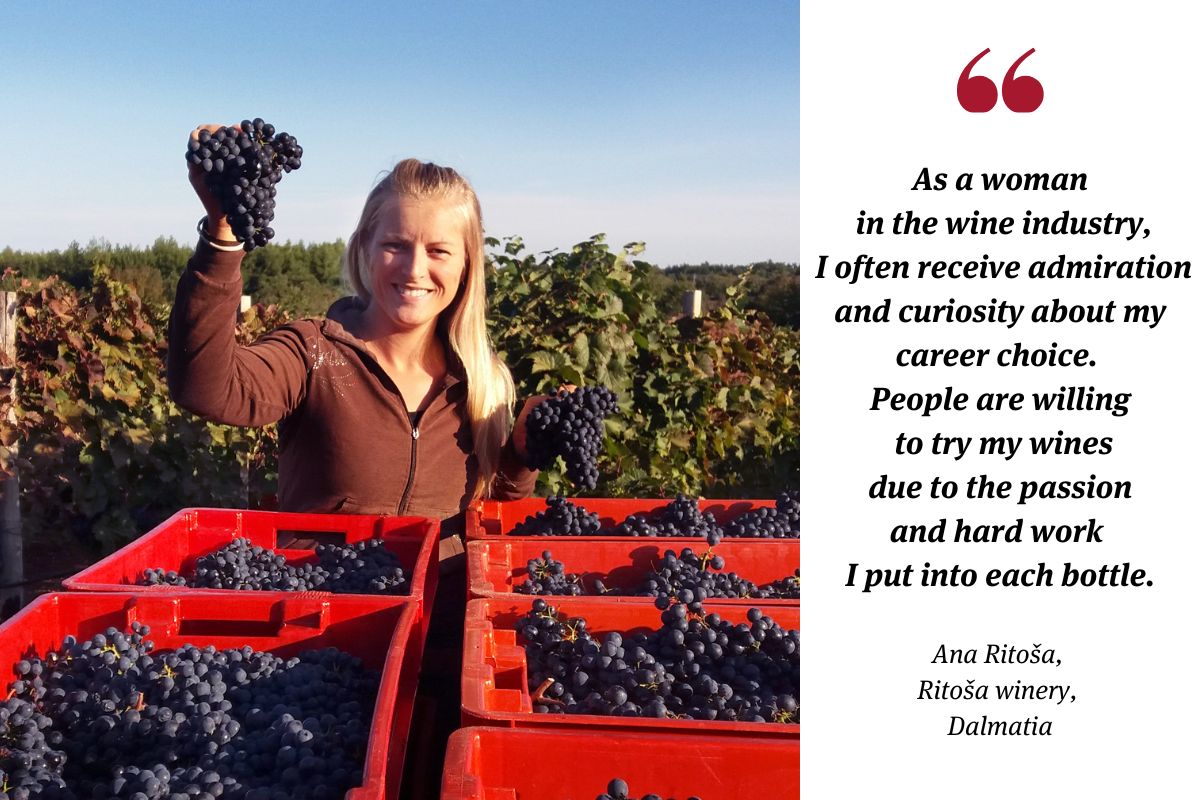
Another daughter of a strong father comes from Istria. Ana Ritoša, from Ritoša winery in Istria, now runs the place, home to many beautiful Istrian wines. She is also very positive regarding the challenges females are exposed to, "I understand how it might seem easier for men to handle physical work while also taking care of their families. Sometimes, customers might take men more seriously in certain industries, like winemaking. However, as a woman in the wine world, I have found that people are often surprised and impressed by what I do. They are curious about why I chose this career path and are willing to try my wines because they can see the passion and hard work that goes into every bottle."
This Women's Day, let us take the time to appreciate women winemakers in Croatia and worldwide who prove that women can make wine just as good as men. Sometimes, even better because "In the world of wine, women are increasingly gaining recognition and opportunities. It has been scientifically proven that women tend to have more advanced senses of smell and taste compared to men. As a result, women's wine creations can add a unique energy and bring refinement to wines, which can enhance the overall wine scene." (Ivana Puhelek)
Success redefined
Let's ask women winemakers in Croatia what makes an accomplished woman in their eyes, and Mare Mrgudić answers, "A truly fulfilled and successful woman is someone who defines success on her own terms, based on what brings happiness and satisfaction to both herself and those closest to her. Unfortunately, society often pressures us to follow certain preconceived notions of success, causing many young people to chase after these ideals and ultimately burn out, even if they appear to have achieved success by society's standards. However, this path isn't healthy for individuals or society as a whole, because true happiness comes from within, and a happy individual creates a positive environment that leads to a healthy and content society."
Jasna Antunović adds, "To do what she likes and in which she is creatively fulfilled every day, to be in an environment that suits her with people who are dear and close to her."
Ana Peršurić says, "A woman who achieved herself in the areas she wanted to achieve herself. For me, success means different things than it might for others. I feel successful because I have been able to keep my family's winemaking tradition alive, and I have a loving and supportive family. I am also grateful for my good health and the opportunity to complete my education as I had hoped. With these achievements, I am now able to live a comfortable life and even travel. All of these accomplishments have made me feel fulfilled as a woman, and I am truly happy with where I am in life "
Ivana Puhelek concludes with her view, "A successful and accomplished woman lives the life she dreamed of as a girl, the life she prepared for through schooling and growing up, and the life in which she achieved all her desires and goals, whatever they were."
This Women's Day, we are taking a stand: women from Croatia have always been making great wines and should be celebrated for their achievements, just like every woman worldwide!
Let's celebrate the achievements of women. Let's celebrate it properly. With a glass of women-made wine that shines with its quality and devotion.
Long live our queens!
Article originally published on winendmore.com
Looking for a Job in Croatia? This Week's Top 10 from Posao.hr (March 5, 2023)
March 5, 2023 - Looking for a job in Croatia? A new weekly feature on TCN, in partnership with leading job site agency, Posao.hr, who present a selection of weekly job listings.
How hard is it to find a job in Croatia, and what is on offer?
We spoke to Ines Bokan, director of leading jobs site Posao.hr, who kindly took the time for this excellent interview overview.
This week's top 10 jobs from Posao.hr:
Finax, o.c.p., a.s. is hiring a person in the position of Key Account Manager for Slovenia & Croatia (m/f). Place of work Remote work - Slovenia & Croatia. We offer opportunities for personal development and career growth. Send complete applications via link by March 10th.
Manpower is hiring a person in the position of Business Development Specialist (m/f). Place of work Zagreb. Necessary Communication and organizational skills and proactivity in work. Send complete applications via link by March 12th.
Salzburg AG is hiring a person in the position of SOC Security Analyst / Specialist (m/f). Place of work Salzburg, Austria. Our attractive salary offers are based on current market salaries and are therefore, depending on qualifications and professional experience, above the minimum salary stipulated in the collective agreement. (We are legally obliged to point out that the minimum monthly salary for this position according to the collective agreement is €4,108.55 gross.). Send complete applications via link by March 31th.
Scalable Global Solutions d.d. is hiring a person in the position of Full-Stack Developer (m/f/d). Place of work Osijek. Send complete applications via link by March 26th.
GRAWE Hrvatska d.d. is hiring a person in the position of Senior frontend developer (m/f). Place of work Zagreb. We offer a welcome gift and a personal Buddy who will help you in your first working days and with whom you will feel as if you have been part of the team for a long time. Send complete applications via link by March 12th.
Thermo Stone d.o.o. is hiring a person in the position Human Resources Generalist (m/f). Place of work Novska. We offer a benefits package that applies to all our employees - annual performance bonus, holiday pay, meal allowance, Christmas and Easter bonus. Send complete applications via link by March 20th.
Silverhand Croatia is hiring a German-speaking recruitment assistant (m/f). Place of work Zadar. We offer the possibility of professional development in an international company with an attractive salary. Send complete applications via link by April 15th.
MED-EL Elektromedizinische Geräte GmbH is hiring a Software Developer (m/f/d). Place of work Innsbruck, Austria. Salary will be determined based on professional experience; the formal minimum salary according to the Collective Bargaining Agreement is € 41,691.44. Send complete applications via link by March 17th.
Bridge Personal & Service d.o.o. is hiring a person in the position of Software development / Software developer (m/f). Place of work Celton Austria. Minimum salary per KV 4,500.00 EUR GROSS/MONTH for full-time work. Send complete applications via link by March 13th.
Strabag BRVZ d.o.o. for services is hiring a person in the position of Senior Backend Developer (m/f/d). Place of work Zagreb. We offer you innovative, technologically challenging projects in an international environment. Work with us in a friendly, competent team of 70 developers. Send complete applications via link by March 12th.
For more career options and job listings, visit posao.hr.
![]()
These weekly job listings will appear in the weekly TCN newsletter - you can subscribe here.
****
What is it like to live in Croatia? An expat for 20 years, you can follow my series, 20 Ways Croatia Changed Me in 20 Years, starting at the beginning - Business and Dalmatia.
Follow Paul Bradbury on LinkedIn.
Croatia, a Survival Kit for Foreigners is now available on Amazon in paperback and on Kindle.
CRO Survival Kit: English Talk Show Premieres Today
March 5, 2023 - A new talk show in English, hosted by TCN's Paul Bradbury, kicks off today - meet CRO Survival Kit by 24Sata.
They come in various guises.
Tourists. Expats. Digital Nomads. Remote Workers. Returnees. Diaspora.
Foreigners and Croatians with foreign roots with an interest in Croatia, many of them living permanently in Croatia.
How does Croatia look through their eyes, and what are the issues which concern them the most here?
Always ready to leave my comfort zone, I am delighted to announce a TCN partnership with 24Sata to bring you the first (at least I think so) talk show in English discussing issues about Croatia through the eyes of foreigners and returnees.
We begin with four guests originally from the diaspora, but now loving life in the Homeland. This is a growing trend, and you can learn more of these and many other stories in our series, Croatian Returnee Stories.
Meet Eugene and Andrian from Australia, Marijana from Canada, and Maria from Austria. They have all made the decision to return to Croatia and are all currently living happily in Zagreb.
I hope you like the show, and your feedback is very welcome. The next show is due to go out on March 19 at midday on the 24Sata Promo channel. This second show will feature 4 digital nomads from the United States on why they chose Croatia, and what makes Croatia so magical for them.
Future planned episodes will include doing business, accommodation, bureaucracy, finding work, cultural norms, food and drink, tourism, racism, culture, and various other topics. If you would like to appear on the show, please contact This email address is being protected from spambots. You need JavaScript enabled to view it. Subject TV, with a short para about you and the topics you would like to talk about (from the list above and/or other topics).
You can subscribe to the 24Sata Promo channel here.
****
You can subscribe to the Paul Bradbury Croatia Expert YouTube channel here.
What is it like to live in Croatia? An expat for 20 years, you can follow my series, 20 Ways Croatia Changed Me in 20 Years, starting at the beginning - Business and Dalmatia.
Follow Paul Bradbury on LinkedIn.
Croatia, a Survival Kit for Foreigners is now available on Amazon in paperback and on Kindle.

Exploring Croatian Recipes: The Warm, Hearty, Slavonian Bean Stew
March 4, 2023 - March, feels like January. Disappointment, or an excuse to keep enjoying all the comforting winter food? We know which option we're choosing. And one of the absolute favourites in all parts of Croatia to do just that must be the bean stew. Though it is not an exclusively winter meal, cold days are made for a plate of this golden goodness. Read on and cook along for the Slavonian bean stew.
The ingredients and recipes for this perfect winter meal vary according to region, but the base is usually the same - white beans, onions, optional vegetables like carrots and parsnips, and cured meat. In Dalmatia, for example, pasta is added for extra texture and nutrition, while in most other places, a plate of hot bean stew is easily cleaned up with some fresh bread. Sides, or salads, if you like, are not always served with a bean stew, but if they are, finely chopped onions are probably the top choice. Pickled zimnica vegetables are a close second. As long as it's salty and flavourful.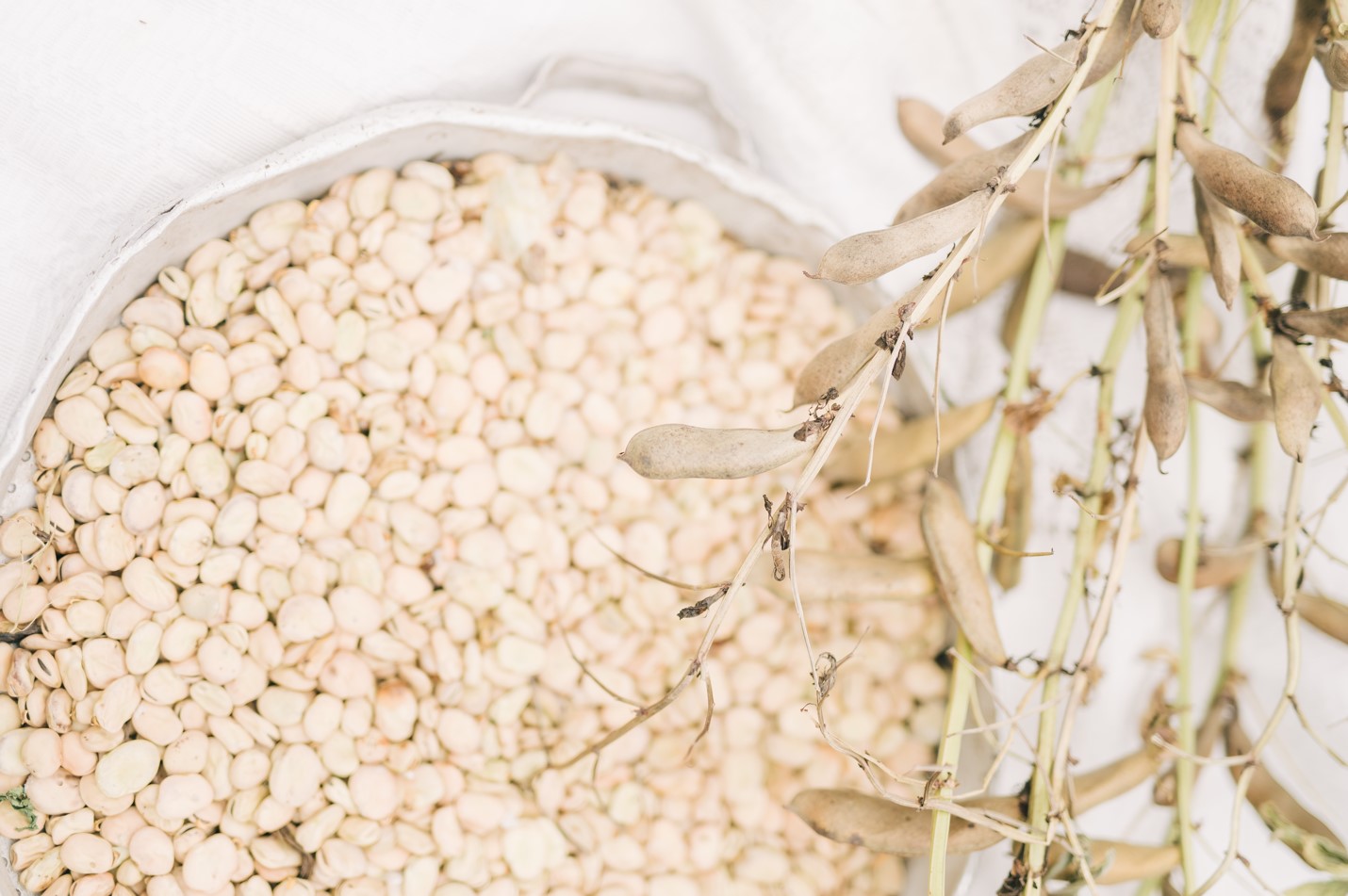
Today, we're sharing the traditional Slavonian bean stew recipe. The most important aspects of many Slavonian recipes are simplicity and quantity. Traditionally, the people in the east of Croatia would spend a lot of time working in their fields and farms, and their families were closely knit together. This meant that there wasn't a lot of time for cooking and that meals needed to be efficient in feeding many people for many hours of hard work. This is why you'll find that everything in Slavonia needs to contain lard and a side of bread, and must be cooked in a pot the size of a small barrel.
Beans have always been relatively easy to plant and grow and simple to store in large quantities. The most popular variety, still used in most recipes, has been the white bean. And in the winter, another ingredient that would be on hand is a variety of cured meat, be it sausage, bacon, pork knuckles, or ribs. Combine the two and you get a full pot of nutritious deliciousness. Ok, here's how to do it exactly. A recipe o feed six people twice, or twelve people once — the only proper way to cook a true Slavonian bean stew. 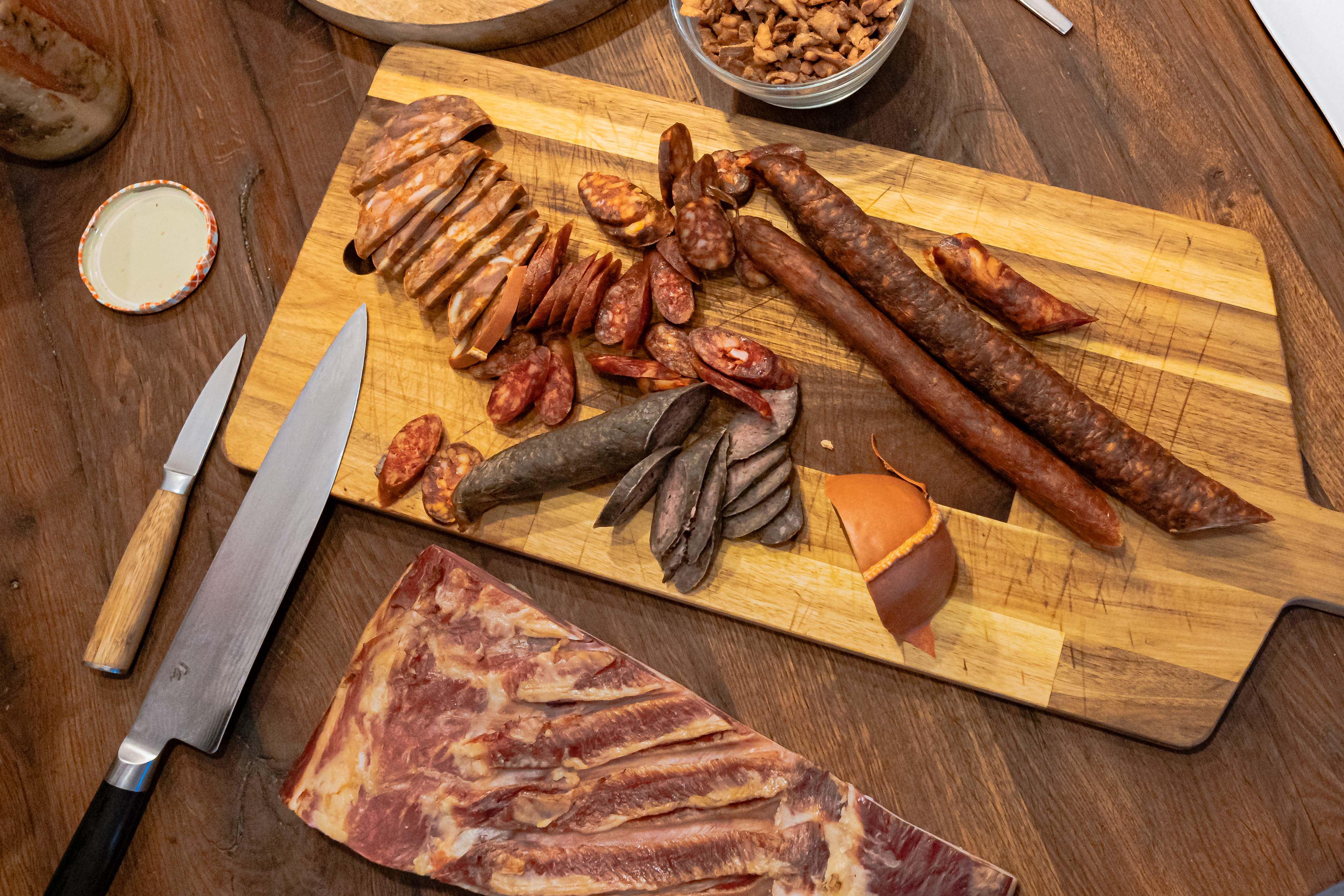 Steve Tsentserensky
Steve Tsentserensky
Ingredients:
- 600g of dry beans
- 2 medium onions
- 2 tablespoons of lard (or 4 tablespoons of oil)
- 4-5 tablespoons of flour
- 5 cloves of garlic
- 2 tablespoons of paprika
- cured meat of choice
Instructions:
1 Soak your beans overnight. There might be debris floating - get rid of that, and rinse your beans throrougly.
2 Boil the beans - more debri might rise to the top and the water might turn darker - get rid of that as well, and rinse once again.
3 Finely chop your onions, add them to the beans, add the cured meat, fill the pot with water and cook on low heat until the meat and beans both turn soft (about 2 hours). Tip: if the beans start cracking, they're done.
* Salt to taste - this will depend on which and how much cured meat you use (usually salty).
4 Brown your flour - heat up the lard and add about 4 tablespoons of flour, stirring continuously until it turns golden. Add the finely chopped garlic and paprika. Leave to cool for a couple of minutes and add water.
5 Add the browned flour mixture to the beans and meat. Stir until the stew has turned golden brown and thickened.
6 Serve with some fresh bread and onions, enjoy until you can't breathe.
Bonus: this is one of those meals that is necessarily made to last at least two days. If for whatever reason you need it to feed even more people on the next day, or just want to make it taste different, you can repeat steps 4 and 5 to make it thicker and have your special next day Slavonian bean stew.
For more, make sure to check out our dedicated Lifestyle section.
Croatia to Support Road Connecting Ravno in BiH to Slano in Cro with €7.3m
March 4, 2023 - On Friday, the Croatian Minister of Maritime Affairs, Transport, and Infrastructure, Oleg Butkovic signed an agreement with the mayor of Ravno, Andrija Simunovic, by which Croatia will help with 7.3 million euros in the construction of a road that will connect the Ravno municipality with the village of Slano in Croatia.
As 24Sata writes, the highway connecting the southernmost municipality in Bosnia and Herzegovina with the border of Croatia in Slano via the villages of Zavale and Orahova Dol will enable its residents to reach their destination in ten minutes. The Government of the Republic of Croatia recently approved about 7.3 million euros for this project. Minister Butkovic stated that this is an extremely important road for the development and survival of people in the Ravno municipality.
"This road opens up new opportunities for this municipality, for the people who live here in terms of tourism, economy, and demographics. Of course, some things will take place here in a more positive way than they have been so far," said the Minister of the Sea, Transport, and infrastructure after signing the contract.
The mayor of Ravno, Andrija Simunovic assessed that the road connecting this municipality with Croatia is the most valuable project implemented since the municipality was established 30 years ago. "This project will revitalise the entire area from Orahova dol, Ravno, Spilja Vjetrenica, and Popovo Polje. This project is also significant for the demographic recovery because it will only take 10 minutes to travel from Zavala to Slano," said Mayor Simunovic.
The signing in Ravno was also attended by the leader of the Croatian National Assembly of Bosnia and Herzegovina, Dragan Covic. He assessed that during the two mandates of Andrej Plenkovic's Government, relations between BiH and Croatia and Croats from the two countries experienced a 'renaissance'.
Butkovic and Covic previously discussed several other projects in Mostar. Among them is the initiative to re-establish the Croatia Airlines flight between Zagreb and Mostar.
For more, make sure to check out our dedicated News section.
Sibenik Archaeologist Finds Remains of 1944 American Heavy Bomber
March 4, 2023 - Sibenik archaeologist Andrija Nakic, employed at the Sibenik Fortress of Culture, discovered the remains of the American warplane B-24 Liberator, which crashed near Brnjica in the hinterland of Sibenik after an unsuccessful attempt to bomb Vienna and Graz in 1944 in the Second World War. The story of the landing near the unsuspecting airport on Pokrovnik is quite fascinating, and it all started with Nakic's great-grandmother.
"It's a story that has followed me since childhood, but I kind of ignored it until a few years ago. In fact, my great-grandmother hid one of the pilots at her house for a few days. The pilot of the plane headed towards the island of Vis but still decided to land somewhere in the hinterland of Sibenik on solid ground because of the bombs that were supposed to be dropped over Vienna. As the plane was damaged, the entire crew jumped out with parachutes near Brnjica and Pokrovnik on October 13, 1944. That area was a plain and became an improvised airport. As soon as the people from the surrounding villages saw the plane crash, everyone rushed there to collect valuable loot. So there was a clash between the Ustashas and the partisans. Part of the crew was taken away by the Ustashas and part by the partisans after a few days. My great-grandmother kept one, similar to the event in the series 'Allo allo!' - reported the Sibenik archaeologist for Sibenikin.
In short, some of the crew members were taken to Drnis and later transferred to a prisoner-of-war camp, and those who were injured during the parachute landing were transferred to Vis by the partisans. There were 11 of them in total.
There was a Jewish surgeon in the crew as well.
"Leslie Caplan was an American surgeon of Jewish origin, but the Germans still treated him humanely and transferred him to a military camp in Germany. Everything went well, and he returned home. I am in contact with his daughter, who is delighted with this whole story", says the Sibenik archeologist.
Nakic returned to this topic later, sometime around 2020.
"At that time, Americans had a habit of giving airplanes female names, and they named this one from Brnjica 'Nancy Jane 2'. It collapsed right next to the current road that leads from Brnjica to Sibenik, and my son found the first piece of metal. I talked about it, so he went to explore a bit. They were just pieces of metal, but when we dug a little deeper, we also found pieces with engraved names and rivets. I collected about seven or eight bags. And all that without a metal detector, which means there is much more there - explains Nakic.
There are no witnesses to the event.
"Almost all of them passed away. However, as I was very interested in this topic, I managed to get in touch with several people in Croatia who helped me a lot. During the Second World War, more than 700 aircraft fell in our country. Radovan Zivanovic from Opatija certainly knows the most about this. He is a true lover of the subject. Through him, I also got in contact with the Americans. In 1944, they regularly kept diaries about every airplane flight. That helped me a lot. I also found some German documents about the event. Simply by Googling it", says Nakic.
A more detailed text about this research should be published in the journal Miscellanea Hadriatica et Mediterranea, published by the University of Zadar, in Croatian and English.
"Many think this is not a remarkable discovery in the world of archeology because less than 80 years have passed since the plane crash. However, this type of archeology is increasingly popular, and the number of people who love everything related to the Second World War is growing. Let's call it some kind of 'dark tourism.' Since there have been more than 700 such plane crashes in Croatia, it is a specific but promising branch of tourism", concludes Sibenik archaeologist Andrija Nakic.
For more, make sure to check out our dedicated Lifestyle section.
Sisak Fit Project to Closely Monitor Kids' Physical Health and Development
March 4, 2023 - Sisak is the first city in Croatia to launch a long-term project to monitor the development of children from kindergarten to adolescence called Sisak Fit, the city administration reported on Friday.
As 24Sata writes, thirty anthropological assessments per child, carried out by an expert team of kinesiologists, doctors, educators, and teachers, will enable recognition of the child's physical tendencies for sports, health indicators, orientation values, and monitoring of their physical development. The excellent response from parents is quite encouraging, with 58 percent having readily accepted participation in the project.
As announced by the Sisak city administration, the first assessments began in Sisak kindergartens. These data will enable kinesiologists and parents to easily direct children to sports for which they have physical predispositions.
In addition, children who are found to have minor health problems, such as obesity, flat feet, or wrong posture, will be provided training through special programs to correct these conditions so that they do not cause more severe problems in the long term. The data collected in these assessments will also provide orientation values of the anthropological characteristics of the youngest Sisak residents and their physical constitution.
The Sisak Fit project is a continuation of the City of Sisak's investments in sports, as part of which the city was declared the European City of Sports in 2019. In the same year, it received the new Zibel Ice Hall; before that, the Caprag swimming pools were renovated, and in 2021 the City Sports Hall Zeleni Brijeg was built, which enables the work of clubs in indoor and ice sports.
Kindergarten and school children in Sisak have a skating school, a swimming school at the city pool, and an athletics school; the international Healthy Meal Standard for the highest quality nutritional meal for children has been introduced in the schools. In addition, kinesiologists are employed in kindergartens to guide children's physical development as professionally as possible.
The total support for sports in the city budget amounts to 2.7 million euros. The City of Sisak allocates more than 600,000 euros of support to clubs annually through the Association of Sports Associations.
This year, 33 thousand euros will be allocated from the city budget for the Sisak Fit project. It is implemented by the city's Association of Sports Associations in partnership with the Faculty of Kinesiology in Zagreb, kindergartens and elementary schools in Sisak, the Association of Kinesiologists and the Sisak Sports and Recreation Center, and in cooperation with the Croatian Association of Sports Psychologists.
For more, make sure to check out our dedicated News section.
Marko Fakin Successfully Presents Exquisite Wines in New York
March the 3rd, 2023 - For Croatian winemakers, entering the American market represents a significant step forward in their business and gaining global recognition for wine. The Fakin Winery, one of the leading and multiple award-winning Croatian wineries from the village of Bataji at the foot of Motovun, gains a place on the wine map of the world.
The Fakin winery nurtures the typical Istrian grape varieties Malvazija, Teran and Muscat, currently has nine active wine labels, some of which it presented to the American market in February, at several organized tastings and wine presentations in New York.
Members of the Istria Sports Club in New York enjoyed tasting selected Fakin wines. They learned more about the production and family tradition of winemaking through a short presentation and gathering in Astoria, Queens.
“Members of the Istrian Club and guests are extremely honored and grateful that the Fakin family joined our community by presenting and tasting their wines and that they brought the love of Istria to New York. It was a pleasure meeting this family, which produces excellent autochthonous wines with such a great passion and dedication," said Susan Karlic, Head of the Istria Sports Club.
As part of the special Food and Wine Stories of Croatia event on February 21 in the Villa Berulia restaurant, Marko Fakin presented his Malvazija Istarska and Teran to experts, journalists and sommeliers, and all interested wine lovers, who had the opportunity to meet the Fakin family and taste Istrian wines with a dinner of four courses of carefully selected dishes that went perfectly with the selected wines. The evening was also attended by the Consul General of the Republic of Croatia in New York, Mr. Nikica Kopačević: "The Croatian Consulate is proud of the arrival of Croatian winemakers on the American market."
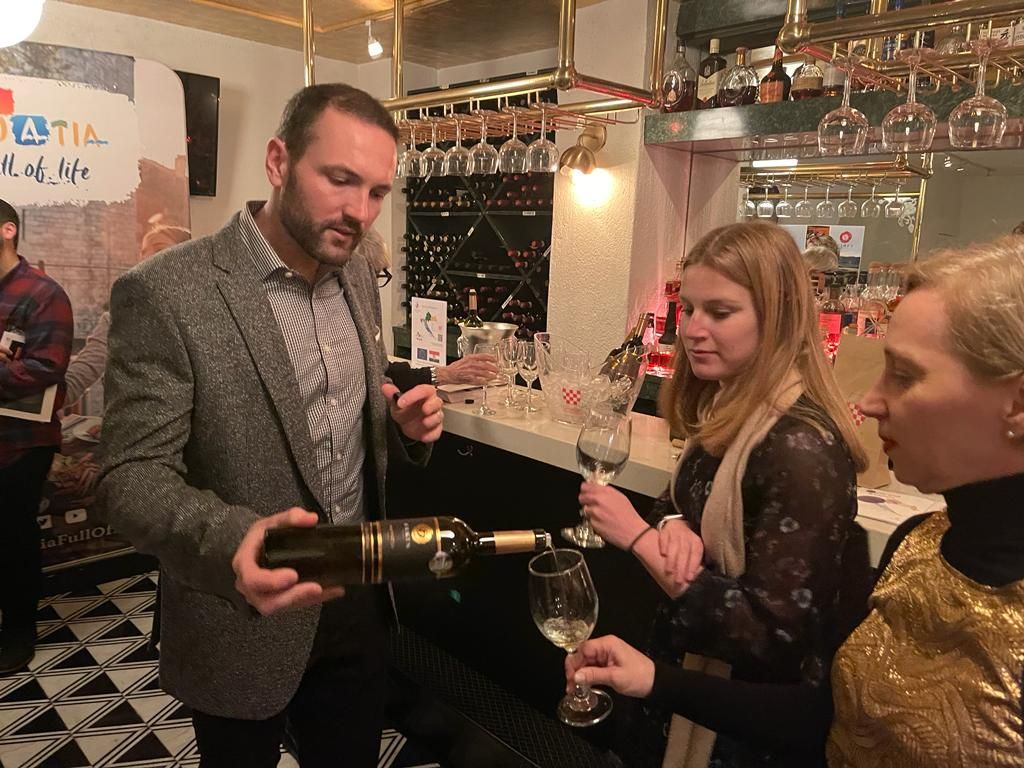
Mrs. Leila Krešić-Jurić, Director for North America of the Croatian Tourist Board, also supported the Fakin family with her attendance, pointing out: "This is the first presentation called Food and Wines of Croatia that we are organizing with the Croatian Premium Wine Imports company in order to present Croatia as a destination with authentic food and autochthonous wine varieties. Namely, apart from the visual presentation, this is what we can best use to evoke the destination and attract American guests. This is because they highly appreciate the quality of food and drinks. The response of journalists and educators about Croatia as a wine destination was excellent, with more than 20 representatives of the profession and media from New York enjoying Fakin wines."
The owner of the restaurant Villa Berulia, Alexandra Ivanac, also expressed her satisfaction after the successful dinner: "It was a true pleasure for us to host Marko and his wonderful family and present their fantastic wines to our guests. We are always proud and grateful when we can support Croatians and their families. We really want many more successes like this."
Marko presented his fresh Malvazia, fresh Teran, aged Teran Il Primo and Muscat yellow, along with selected gastronomic specialties, at the konoba Vinoteka 46 in Huntington, Long Island, on February 25. Their host and owner of Vinoteka 46, Danijel Pedišić, emphasized on that occasion: "It was such an honor for us to host the Fakin family in our restaurant. Croatian wines are increasingly accepted in the USA, and always especially by the Croatian American community. I believe that the sale of Croatian wines will grow year by year in the USA and that we will have many more events like this with Croatian winemakers."
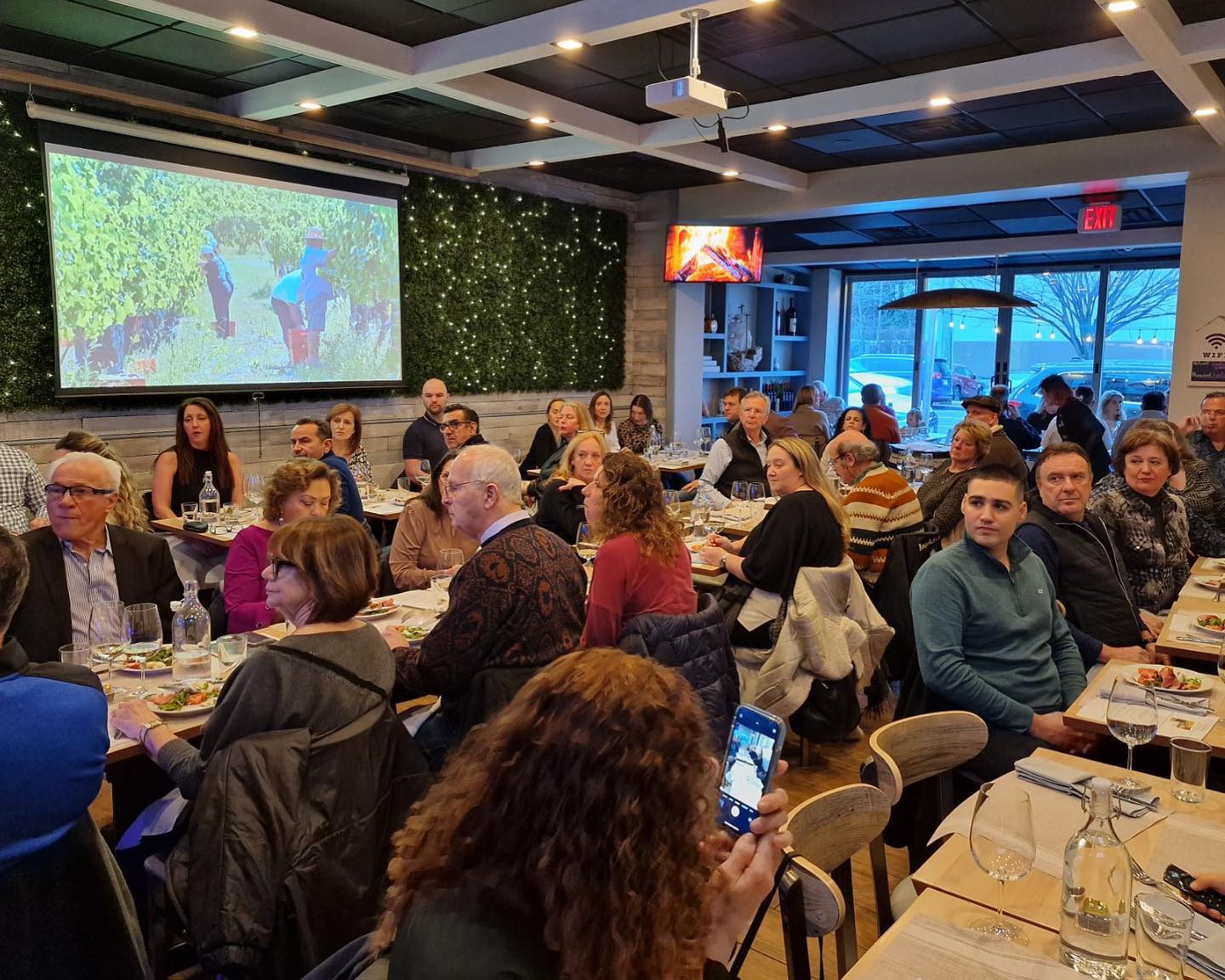
Marko Fakin concluded his trip to New York as a live guest at Croatian Radio New York on February 25. During the broadcast of the Voice of Free Croatia hosted by Petra Pesa, he talked about his winery, top wines and autochthonous varieties he grows, and shared history, stories and traditions of his family.
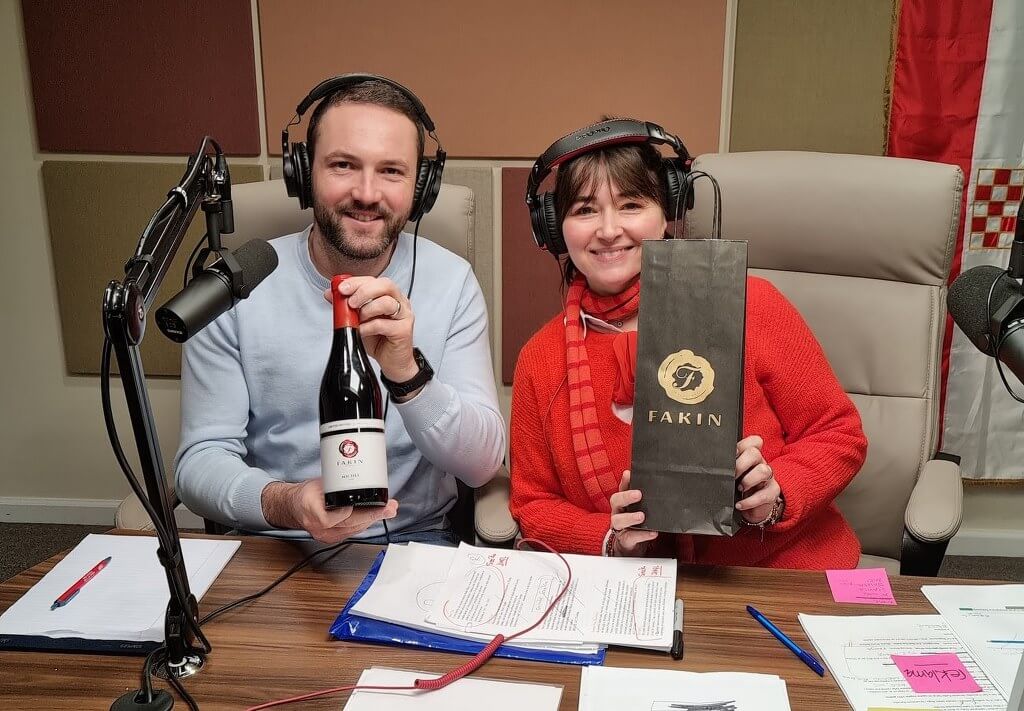
"We are very happy that we had the opportunity to present our wines in New York, to media representatives, sommeliers, our Croats in the USA, and all the wine lovers who came to support us and enjoy socializing, a tasty bite and a delicious drop with us. For organizing wonderful evenings and gatherings, we would like to thank the Istrian Sports Club, the restaurant Villa Berulia, and the konoba Vinoteka 46 for the hospitality they provided. A special and very sincere thanks to the company Croatian Premium Wine Imports headed by Mrs. Mirena Bagur for the exceptional help and cooperation during our trip. "Thank you TZ Istra and Vinistri for your constant support," Marko Fakin commented after his very successful visit to New York.
"In order to be able to create a category of Croatian wines in shops and restaurants, we as importers, winemakers and all wine and tourist institutions, such as HTZ in New York, TZ Istria and Vinistra, with whom we cooperate, need to strategically educate the market about Croatian autochthonous varieties. For this, it is necessary not only top wines such as the different varieties of Malvasia and Terano of the Fakin Winery, but also the knowledge, will and hard work of how to present them, and this is where Marko and Bety Fakin excel with their professionalism and approach," said Mirena Bagur, co-founder of Croatian Premium Wine Imports, Inc., a company that imports and distributes Croatian autochthonous wines in the USA.
The culture of producing top quality Fakin wines is the result of specific Motovun soil, a favorable climate with lots of sun and lots of wind, along with a great knowledge of our own grapes, but also experience, dedication and long-standing family traditions that ensure the top quality of carefully cultivated varieties.
As a winery from Croatia that has won a gold medal at Decanter, the largest and most important world wine competition, for six years in a row, and in addition to being an unmissable place for complete eno-gastro enjoyment, the Fakin winery is surely and resolutely building its way to the top of the domestic and international wine scene.
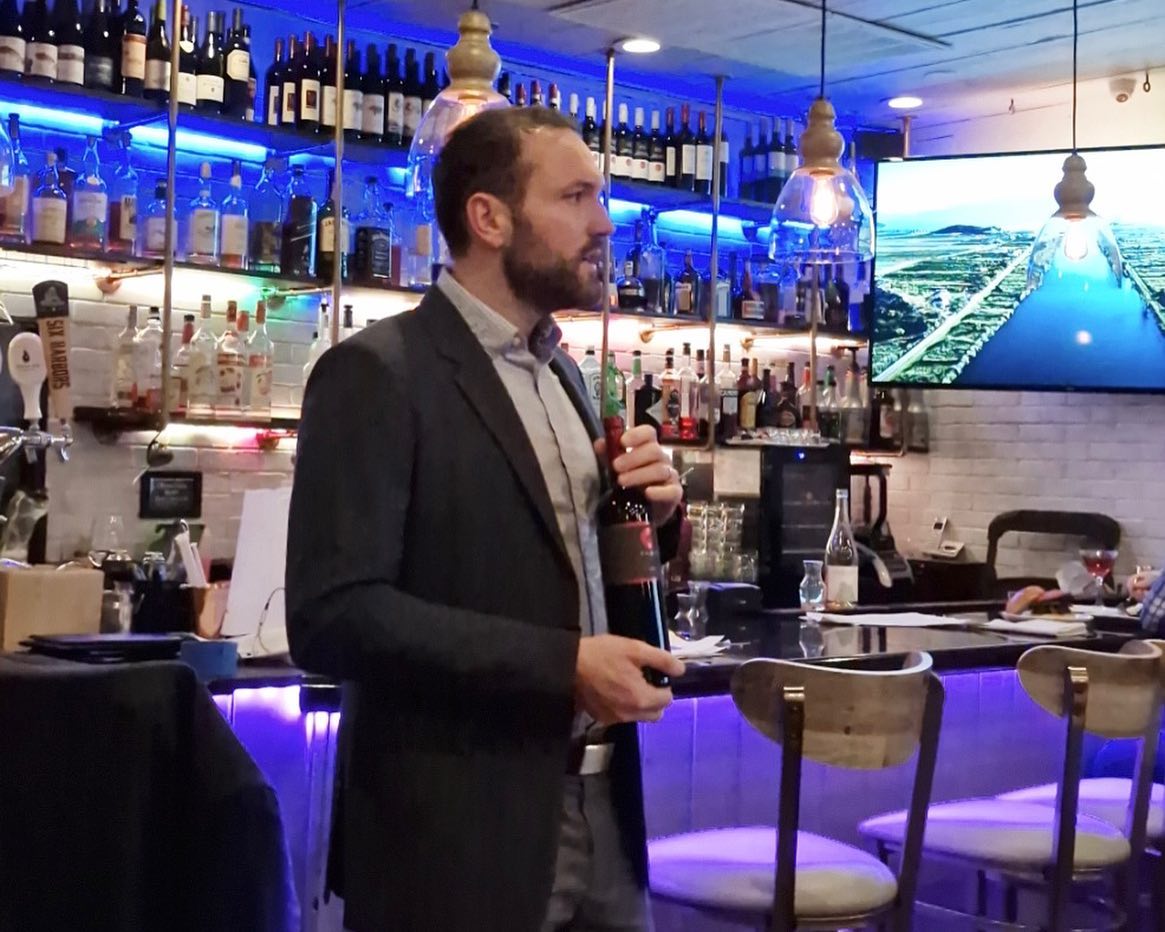
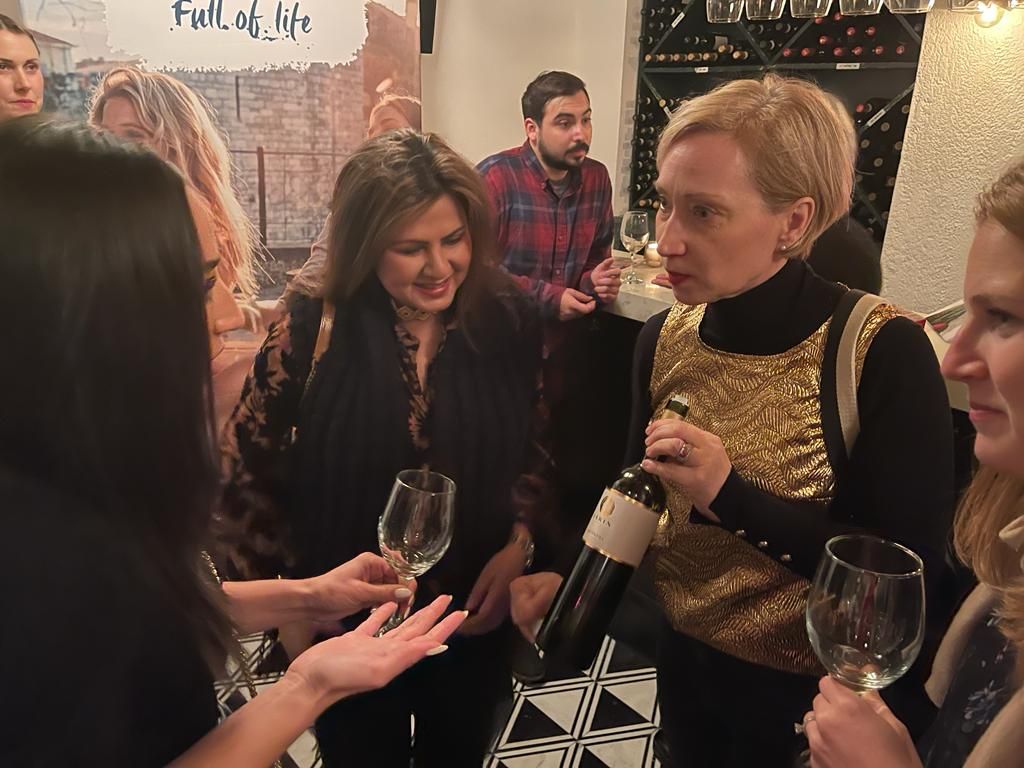
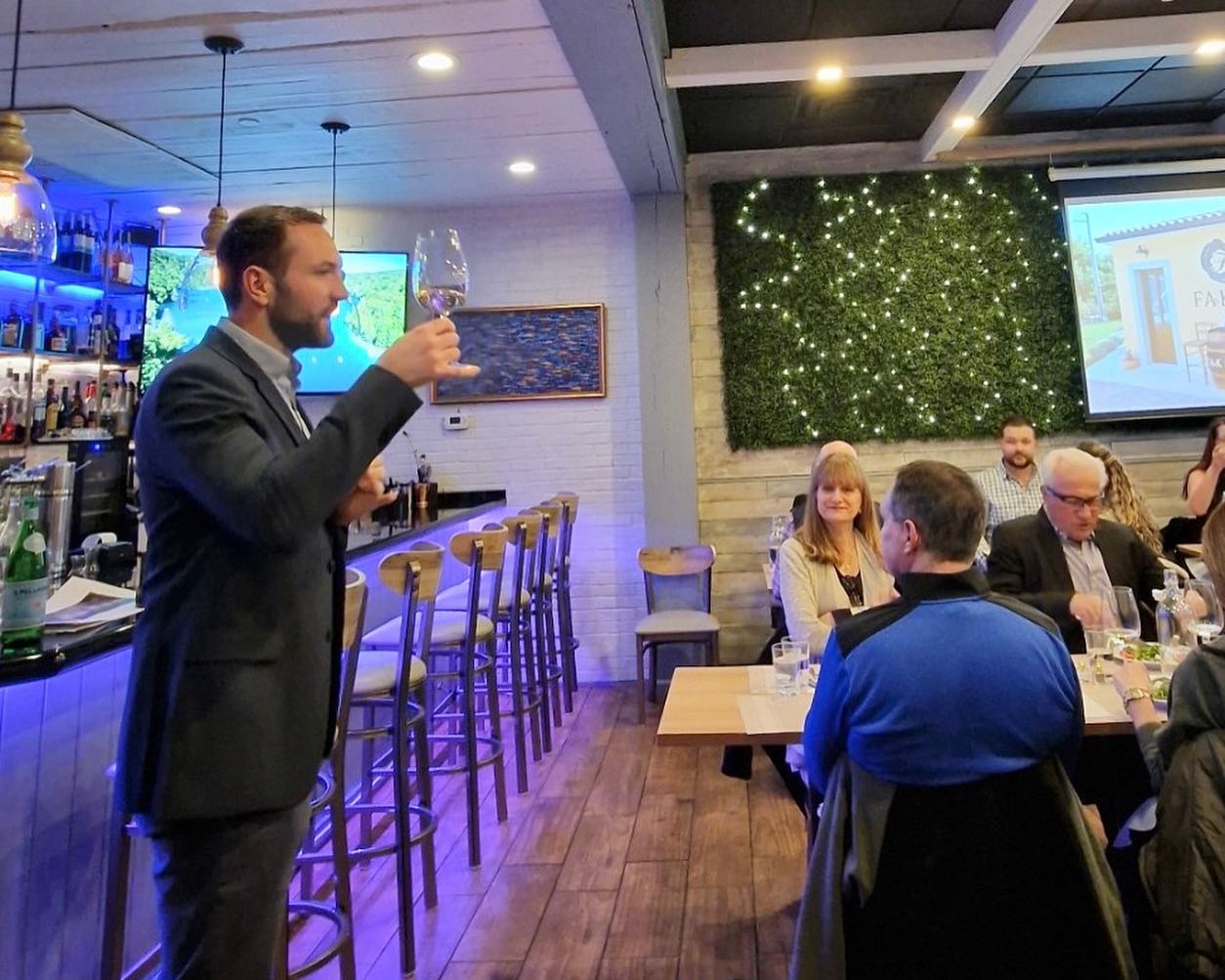
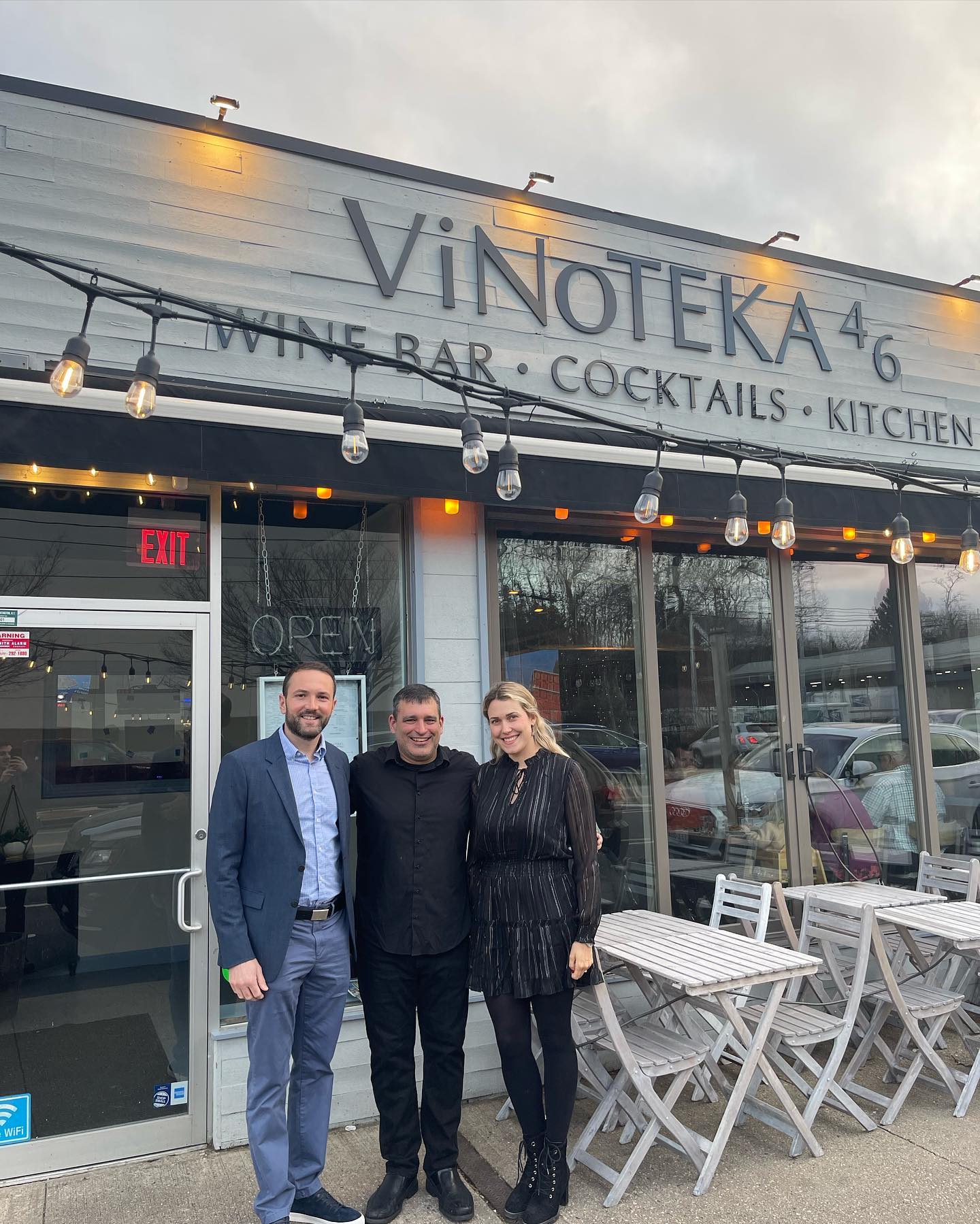
For more, check out our lifestyle section.
Sunflower Award: Slavonia and Baranja for Your Ultimate, Authentic Croatian Holiday
March 3, 2023 - The Adriatic is undeniably beautiful; Istria is a fragrant, colourful heaven on Earth, but trust us, and head on east to Slavonia and Baranja for the Croatian holiday you didn't know you needed. The food, the wine, the rivers and forests, the cycling and adventuring, the tradition and culture - it's got it all. And that is recognised in various ways, most recently in the form of the Sunflower Award of the Croatian Association for Tourism and Rural Development of the "Selo" Members Club.
As SiB writes, the awards ceremony was dominated by winners from the Osijek-Baranja county. For example, the Municipality of Kneževi Vinogradi won the Grand Golden Sunflower championship title as the best Croatian wine destination.
"This truly honorable award is the result of many years of joint work of winemakers and winegrowers from our area, associations that organise events, and the support provided by the Municipality of Kneževi Vinogradi. This is an incentive for us to continue working on the quality of our wine destination, which is recognised not only by the profession but also by an increasing number of visitors," said the head of the Municipality of Kneževi Vinogradi, Vedran Kramarić.
Steve Tsentserensky
In addition to the championship title of the Great Golden Sunflower of the Municipality of Kneževi Vinogradi, there were five other winners from Osijek-Baranja County. The Tourist Board of Osijek-Baranja County received the gold award in the category of rural tourism projects for the wine tourism development project Land of Wine. The gold award in the category of traditional (rural) gastronomy was awarded to the restaurant Čingi Lingi Čarda in Bilje. With good reason, the gold award in the category of rural tourism projects was awarded to the Presentation and Education Centre Tikveš in Kopački Rit. The gold award in the category of projects/holders of protected and marketing trademarks was awarded to the House of the Baranja Kulen in Beli Manastir, while the bronze award in the category of traditional (modern) households went to Villa Edl Elegant in Aljmaš.
Aljmaš - Steve Tsentserensky
The Sunflower Awards for rural tourism in Croatia is a project that once a year evaluates and presents traditional content, preserves authenticity, and connects participants in rural tourism. It is awarded in eight categories.
"I am proud that from the very beginnings and creation of rural tourism in our country, I have been supporting and advising people who are just starting in this segment of tourism," said the president of the Croatian Association for Tourism and Rural Development of the "Selo" Members Club, Dijana Katica, who has been organising the largest and most significant event in rural tourism for the last ten years.
In recent years, Osijek-Baranja county has seen continuous growth in the number of visitors and overnight stays, thus becoming one of the most attractive continental destinations. Through the HeadOnEast project, which brands the County as a tourist destination, and the event of the same name, which last year became the most significant event in Osijek-Baranja County due to the number of visitors, additional preconditions have been created for an even stronger development of the tourist offer. This is supported by this year's prestigious title of the global travel platform Booking.com, which declared Osijek-Baranja County the most welcoming region.
"The friendliness and hospitality of the Osijek-Baranja County will also be shown at the next Sunflower rural tourism award ceremony, which we will host in our county at the end of this year. It will be an opportunity to show all our tourist potential, natural beauties, rivers, the Kopački Rit nature park, castles, endless vineyards, and a rich local wine and gastronomic offer," said prefect Ivan Anušić.
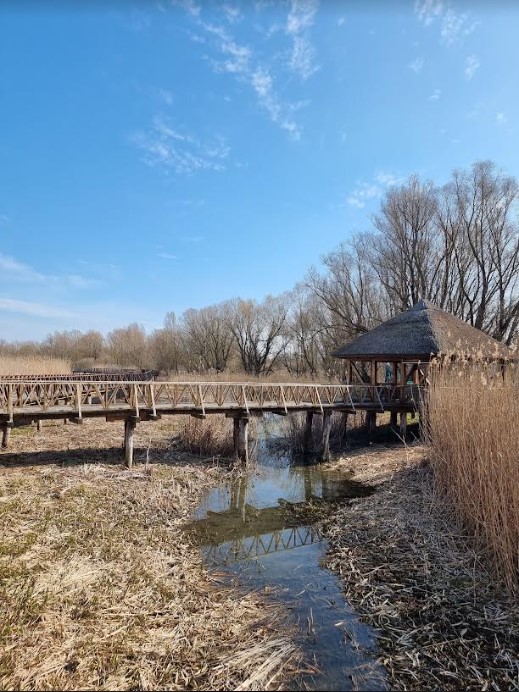
Kopački Rit Nature Park
The Vukovar-Srijem County received several awards as well.
Adrenaline park Bosut Rokovci-Andrijaševc won the gold award in the category of active tourist facilities in rural areas. It is a precious reward for dedicated work and development of outdoor activities, but also teamwork to solidify Andrijaševci and the Vukovar-Srijem County as a top destination of Croatian continental tourism, writes Vinkulja.hr.
The silver award in the category of traditional (rural) households went to the Šokačka Lady Holiday House in Županja, while another silver award in the category rural tourism projects went to Županja for the event Šokačko Sijelo. The bronze award in the category of rural tourism projects was awarded to Stanarski Susreti event of the Association "Šokadija Babina Greda".
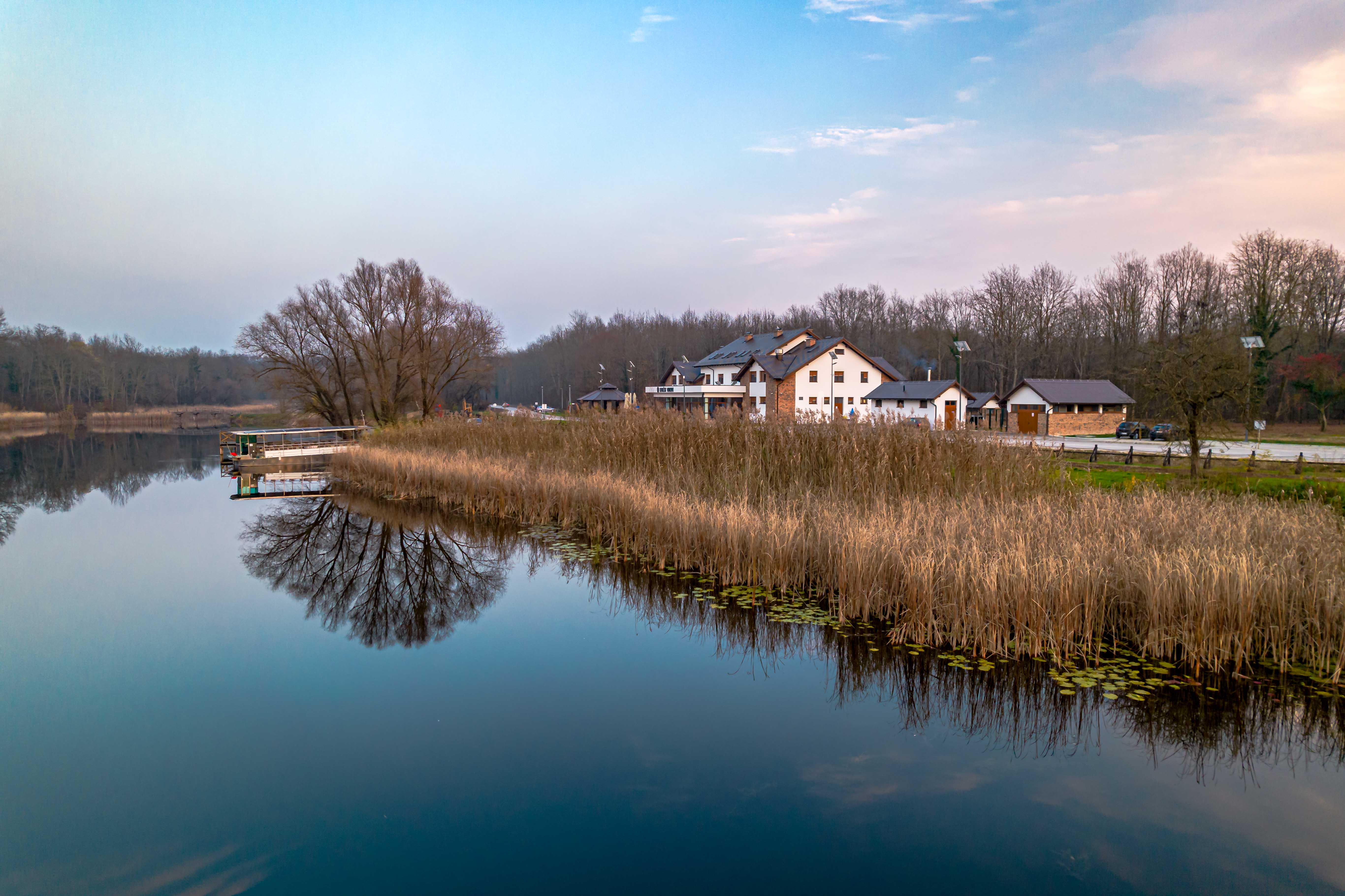
Steve Tsentserensky
"We are also extremely proud of the winners from the area of Vukovar-Srijem County and send our most sincere congratulations to all winners in all categories. Special thanks to Mrs. Dijana Katica for years of work in recognising, motivating, educating, and promoting all stakeholders in the development of rural tourism in Croatia. Let's continue to be loyal to all the tourist values of Croatia and persistent in their development for the permanent benefit of our valuable citizens and our irresistibly beautiful and immeasurably rich homeland", said Majda Jakša, director of the Tourist Board of Vukovar-Srijem County.
For more, make sure to check out our dedicated Travel section.
A Week in Croatian Politics - GDPR Violations and Confidence Votes
March the 3rd, 2023 - This week in Croatian politics, we've had government failings and alleged GDPR violations, the plight faced by doctors and other healthcare professionals being ignored by the powers that be, and Plenkovic was put to the competency test.
The government's proposed "white list" of stores fails spectacularly, here's how
The state has proven once again that it likes to interfere in things it doesn't actually remotely understand, according to Branimir Perkovic. When it comes to thinks in which it should not be involved at all, it ultimately does badly. The most recent blunder of all is the famous so-called "white list" of stores and others operating within the trade sector, hastily drawn up to protect the government from having to deal too much with politically unpleasant price comparisons of stores in Croatia and other Eurozone countries.
This "application" (which it actually isn't) had been being announced for weeks by many at the helm of Croatian politics, primarily by Minister Davor Filipovic. On the eve of its presentation by Filipovic's ministry, a media conference was held where the project, which they persistently and wrongly referred to as an app, was presented.
"We think that this way of informing the public is very good and that white lists will help people make decisions when purchasing things and will be able to give confidence to retail chains that have decided to be transparent," Filipovic said the day before the price movement ''app'' was released to the public. In the weeks leading up to the site's launch, he repeatedly spoke about this, praising the project and emphasising its importance.
After no more than a few days, according to Filipovic's announcements, it became clear that practically nobody anywhere was making any purchase decisions based on the government app that isn't an app. For starters, although it's persistently presented as an "app", it's actually just a regular website. Someone in the Ministry of Economy should know that the apps are intended for use via mobile phones and tablets, and currently the so-called white list of Croatian traders exists only as a website.
Nobody uses the government website, it allegedly violates the law and it's impractical
The real problem is that it isn't useful at all, as evidenced by the low to no use of it. The ministry boasted that it was visited a total of 34,789 times from February the 17th to March the 2nd, but most of these visits (a massive 60 percent of them) were made in the first two days alone.
After the first seven days of the site being live, the daily number of visits dropped to less than 1000, and in the past seven days it is less than 700. It's obvious that the users have assessed that it isn't a useful tool, and most of don't return after visiting once. There was such a rush to create the "app" that the Electronic Communications Act and the General Data Protection Regulation, i.e. GDPR, were entirely forgotten. The state has therefore managed to do something new that allegedly violates the laws of that same state. Not only that, but the state would severely punish both private companies and individuals for the same omission.
In this way, the Personal Data Protection Agency (AZOP) will only inform the competent institutions, in this case the Ministry of Economy, that they should comply with the GDPR as soon as possible. Because as things currently stand, according to Croatian and European Union law, this app, site, or whatever it is, violates the privacy of its users.
"The analysis of the website found that the site does not have a cookie banner for consent to the processing of personal data, and stores two cookies on the equipment of the user/visitor of the site, which requires the prior consent of the user,'' replied the Agency for personal data protection upon receiving Telegram's inquiry about the GDPR issue.
It's hard to believe that all of the listed prices are the same in all branches of certain stores across the whole country
The truth of the data on it is also not being checked by anyone. Maybe the prices in the three retail chains (Konzum plus, KTC and Tommy) really are as they are stated on it, although it's quite hard to believe that the same price is valid for so many products throughout Croatia. Every regular store visitor has noticed that the price of a certain product is often not the same even in the same city/municipality in different stores of the same retail chain.
"That site was created only so that politicians would give the impression that they're doing something"
"The goal is to influence possible price increases and the trend of inflation, because when people see who is correct, they will know how to appreciate it," said Minister Filipovic when launching the "app". But the people ignored his little project. Money was spent, no effect was had.
"I don't see how a movement-price page can be relevant for anyone on any topic," IT expert and analyst Marko Rakar commented for Index. "That page was created only so that politicians would give the impression that they're doing something," he concluded.
An app that isn't app, that no one uses, that doesn't protect the privacy of its users and the accuracy of which is questionable. For "only" 26,000 euros. It could have been worse. In fact, there were worse projects, if we only take a trip back in time to the infamous CRO card saga, a more or less forgotten failure of the Tourism Ministry.
A vote of confidence (or no confidence, as the case could have been) in PM Andrej Plenkovic took place recently
The world of Croatian politics is a turbulent one, and Plenkovic is usually somewhere in the limelight. The vote of confidence in Prime Minister Andrej Plenkovic confirmed recently that the majority of MPs remain behind him, and it also revealed that as many as seventeen MPs from the opposition that rather loudly initiated the proceedings in the first place didn't bother to show up for the vote at all.
Who among the opposition didn't even bother to come cast a vote?
Davor Bernardic (Social Democrats)
Erik Fabijanic (Social Democrats)
Katica Glamuzina (Social Democrats)
Rajko Ostojic (Social Democrats)
Sanja Udovic (Social Democrats)
Emil Daus (IDS)
Marin Lerotic (IDS)
Sinisa Hajdas Doncic (SDP)
Ante Kujundzic (Most/Bridge)
Zeljko Lenart (HSS)
Natalija Martincevic (Reformisti/Reformists)
Marijana Puljak (Centar/Centre)
Zeljko Sacic (Hrvatski suverenisti/Croatian sovereignists)
Dario Zurovec (Focus)
Vinko Grcic (Independent)
Stjepan Kovac (Independent)
Miroslav Skoro (Za pravednu hrvatsku/For a just Croatia)
Who abstained?
Milan Vrkljan (Za pravednu hrvatsku/For a just Croatia)
There were 74 opposition MPs in the parliament, and 56 of them raised their hands as a vote of no confidence in Plenkovic and his leadership as Prime Minister.
"Those who didn't even bother to turn up and aren't sick or have no other valid reason not to come will have to explain this within their own parties," said Pedja Grbin (SDP). "The ruling majority is still at 77, and that says we still have those who don't see, don't want to see, pretend not to see, or are completely aware of everything and don't really care what's happening to this country at all," he asserted.
Nikola Grmoja (Bridge/Most): We didn't even think it was possible to gather enough hands anyway
Regarding the fact that the opposition didn't come out in full force, Nikola Grmoja from Most pointed out that they didn't even think it was possible to gather enough hands to topple the prime minister anyway.
"A vote of no confidence is an instrument used by the opposition to warn people about the state of society, about all the scandals, the fact that Plenkovic's associates are trading in influence and that he himself is mentioned as the one in whose office Gabriela Zalac's controversial software was presented... So the opposition did everything it could could, we can't do more than this. If we could, then we would be the government," Grmoja pointed out, adding that this is the largest number of votes the opposition has collected in a vote for an initiative.
Bencic: They voted with their absenteeism
When asked what about those who didn't bother to come to vote, Sandra Bencic (We Can!/Mozemo!) said that not coming is justified for some who have a medical reason for not being present or were prevented by legitimate obligations. But those who don't have it, she added, voted by not attending anyway.
Bencic clarified to a journalist's question that Milan Vrkljan will no longer be invited to opposition meetings and agreements because he cannot participate as a member of the majority in opposition agreements.
The European Union provided the funds to help Croatia in its post-earthquake mess one year ago, but the government is only now ordering prefab housing for those affected by December 2020's Petrinja earthquake
The Ministry of Spatial Development, Construction and State Property has published the Draft Procurement Documentation in EOJN - Prior consultation with interested economic entities for the subject of procurement: The procurement of mobile and modular prefabricated/dismantled houses, including technical specifications.
What kind of housing has been ordered?
The plan is to acquire 500 wooden houses with a size of 25 m2 for one to two people and the same housing spanning 35 m2 for two to four people. The total estimated value of the procurement is 14 million euros (without VAT), and the open high-value public procurement procedure is divided into six groups that refer to the area of Sisak-Moslavina County.
As prescribed, the housing unit must have one space that serves as a kitchen and living room, then a bathroom and one or two bedrooms. It will be equipped with basic equipment - sanitary facilities, kitchen elements, basic appliances, such as a stove and refrigerator, a dining table, beds, and so on.
"Aside from the primary use for the purpose of temporarily taking care of the users whose houses were damaged during the Petrinja earthquake, the houses in question are planned to be moved and used for other purposes later. Accordingly, they must be made in such a way that they can be quickly dismantled and transported to another location without damage,'' reads the competent ministry's documentation preceding the public tender.
EU money has been available for this for more than a year now
Minister Branko Bacic also spoke about the initiation of the preliminary consultation procedure for the procurement of the aforementioned wooden mobile homes for the temporary accommodation of users at a recent government session. He invited Croatian manufacturers and builders of wooden prefabricated houses to participate in this consultation and assist in the procurement of such wooden houses.
The ministry also plans to finance the wooden houses with money from the European Union Solidarity Fund. The problem with the whole story is that this money has been available to Croatia for more than a year now, i.e. since December the 30th, 2021. Things move painfully slowly in Croatian politics, and it should be noted that volunteers had been erecting similar wooden houses in Banovina for several months after the earthquake, and the government is only now starting this process, years after the terrible Petrinja earthquake struck Central Croatia.
A temporary solution once again, and at the last minute before the chance to use EU money expires - again
Instead of wooden houses, which typically make for much more comfortable accommodation, many victims of the Petrinja earthquake are still living in small, cramped tin containers. The government is only now planning the acquisition of more comfortable accommodation, but again it's temporary. There isn't much talk about proper, permanent replacement houses yet.
In addition, the government found itself in a race against time, because the opportunity to spend European Union money from the Solidarity Fund expires in just four months, which means that the work must be completed by the end of June. If nothing else, the government at least, after more than two years, finally realised that tin containers and container settlements are an ugly picture that says everything about the non-existent state of the reconstruction ''process''.
The plight of doctors is still being ignored by the government, and the Croatian Medical Chamber is growing frustrated
The Croatian Medical Chamber (HLK) recently announced that a government decision on amendments to the Regulation on job titles and job complexity coefficients in public services is a clear message of them simply continuing to ignore requests from doctors and other healthcare professionals.
The aforementioned government decision on amendments to the Regulation on job titles and job complexity coefficients in public services, which again doesn't contain changes to the coefficients for the three groups of doctors that were agreed with the Ministry of Health last year in August, is a clear message of continuing to ignore doctors' requests, it is stated in the Chamber's press release.
HLK assesses that it is obvious that, for the time being, there's absolutely no political will to meet the demands of grossly underpaid and overworked doctors, and thus neither to make key decisions for the sustainability of the public health system and the remaining doctors in Croatia. The Chamber referred to the meeting back in August last year at the Ministry of Health, when doctors were promised concrete deadlines for correcting these coefficients.
Croatian doctors are demanding the urgent regulation of the salary coefficient system
The Croatian Chamber of Physicians, the Croatian Physicians' Union, the Coordination of Croatian Family Medicine and the Croatian Association of Hospital Physicians demanded urgent regulation of the existing system of salary coefficients for certain categories of physicians.
Medical associations demanded that the government equalise the coefficients of focused specialists with narrow specialists who specialised according to earlier rules, equalise the coefficients of doctors working in primary healthcare with doctors working in hospitals, and to raise the coefficients of residents as well.
Back in August of last year, HLK reported that it had agreed with the Ministry of Health that the deadline for correcting coefficients for doctors was to be the end of 2022, i.e. that these costs must be planned in the budget proposal for 2023. That deadline expired more than two months ago.
For more on Croatian politics, make sure to check out our dedicated section. For a weekly overview, keep an eye out for our Week in Croatian Politics articles which are published every Friday.


